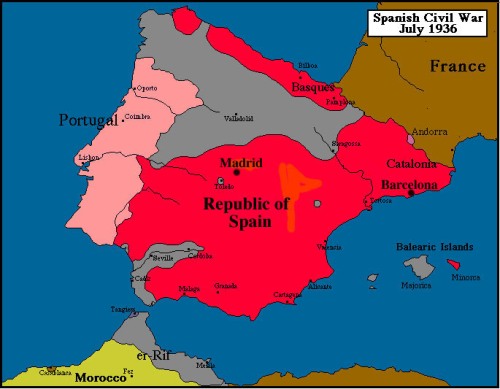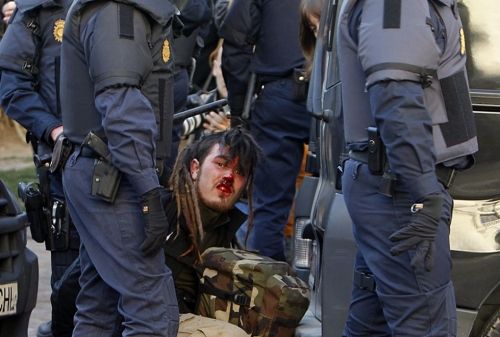Axis of Logic Columnist, Arturo Rosales comments from Caracas on the following video and Spanish law being drafted to make it illegal to photograph or videotape the police in action.:
The following video and subsequent report suggests to us that the Spanish people are moving from "protest" - to open rebellion. The political bloodline of Franco's fascist regime has never really been cut since the Spanish Civil War. It has only been reinvented as a kingdom after the fall of Franco's "republic." Today, the country is undergoing radical change and coming weeks and months will tell what is to become of yesterday's Spain. The video may reveal the time, "When the irresistable force of the people meets the immoveable object of the state." - Les Blough, Editor
Spain to ban photos or videos of police in action Madrid - Allegedly to protect the lives of law enforcement officers, but more likely a crack-down on freedom of expression, Spain's government is drafting a law to ban citizens from photographing or filming police officers at their work. The drafting of this legislation comes amidst waves of protests throughout Spain over the austerity cuts to public healthcare and education. With the Interior Minister, Jorge Fernandez Diaz, stating that they are not cracking down on freedom of expression, the new "Citizen Safety Law" will prohibit “the capture, reproduction and editing of images, sounds or information of members of the security or armed forces in the line of duty,” according to Ignacio Cosidó, the Director General of the police. Cosidó added that the new legislation seeks to “find a balance between the protection of citizens’ rights and those of security forces.” Under this new legislation, it will also be punishable by law to disseminate photos and videos over social networks, like Facebook. The new law will cover all images that could pose a risk to the physical safety of police officers, or could impede them from executing their duty. However, the Interior Ministry stresses that it will not encroach on freedom of expression. Cosido stressed, “We are trying to avoid images of police being uploaded onto social networks with threats to them and their families.” According to the United Police Syndicate in Spain, implementation of this new legislation would be “very complicated”, as it does not establish any guidelines over the types of image that would violate the rights of a police officer. The syndicate says that the ministry will encounter "legal problems" should it not specify clearly the "ins and outs of the law." Despite this Cosidó argued that the measures are necessary, given the “elevated levels of violence against officers” in the economic crisis that is “undermining the basis of a democratic society.” There have been many anti-austerity protests in Spain over the past year, with many reports and much footage of police brutality against protesters. It is clear from this footage that many Spanish police officers do not wear their identification badges during the protests, despite the fact that the law requires this. Legislation that prevents citizens, and for that matter, journalists from taking photos or videos of the police in action during the protests is a clear breach of freedom of expression. In the US, there have been several incidences where video taken by citizen journalists, has cleared defendants in Occupy-related arrests. A good example of this was reported on Digital Journal in the NYPD case against Alexander Arbuckle, arrested for disorderly conduct in the OWS protest early on New Year's Day, but cleared due to the video footage of a citizen journalist, Tim Pool. Ironically, Arbuckle was not even part of the protest, and up until that time actually supported the police. Obviously he changed his tune once arrested by the NYPD. With more and more stories of police brutality doing the rounds in the media, it is a worrying precedent when the right to take photos or videos of police officers is taken away from concerned citizens and citizen journalists. It pretty much gives the police the edge to do whatever they want, and leaves you unable to prove a thing. With recent violence between police and protesters, especially near Parliament in Madrid on September 25, many Spaniards have been shocked by images of protesters, bloodied and in need of medical attention, appearing on the television. Of course it is essential that people know about this kind of violence and what is happening in the streets around them. The video above shows the events in Madrid on September 25, including the brutal attack by the police. Presumably, this type of video would not be allowed under the new legislation? Fernandez Diaz did, however, tell the media, "We do not intend to stop the press from doing its job of taking pictures of police charges and other proceedings. But we understand that in anti-terrorist operations or against mafias you have to have a more careful approach when it comes to disseminating images." This leaves things a little unclear. Does that mean that the media are allowed to take images of police action, but a simple citizen journalist, such as the writer of this article, is not? Lead writer for the Spanish national newspaper, El Mundo, Angel Casaña, published an online editorial saying that photography has changed the course of history. He states that the government's proposed measure could have a negative impact on journalism in Spain. "If this proposal goes ahead, it is going to be impossible to know about events as they occur on the streets just at a time when streets are at boiling point due to the dire economic situation of many families," said Casaña.
Source: Digital Journal |

